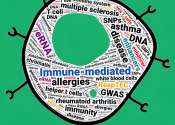Air pollution may affect lupus risk
New research published in Arthritis & Rheumatology indicates that chronic exposure to air pollutants may increase the risk of developing lupus, an autoimmune disease that affects multiple organs.
Jul 10, 2024
0
1
New research published in Arthritis & Rheumatology indicates that chronic exposure to air pollutants may increase the risk of developing lupus, an autoimmune disease that affects multiple organs.
Jul 10, 2024
0
1

Researchers led by Yasuhiro Murakawa at the RIKEN Center for Integrative Medical Sciences (IMS) and Kyoto University in Japan and IFOM ETS in Italy have discovered several rare types of helper T cells that are associated ...
Jul 4, 2024
0
34

A research team including Professor Yoontae Lee and Jiho Park, a Ph.D. candidate, from the Department of Life Sciences at Pohang University of Science and Technology (POSTECH) has discovered that a particular protein promotes ...
Jul 2, 2024
0
64

The protein Foxp3 is vital to the function of immune cells called regulatory T cells, which control immune system activation. Despite its importance, how Foxp3 regulates the immune system using environmental cues has remained ...
Jun 27, 2024
0
32

The Centers for Disease Control and Prevention says wastewater detection of COVID-19 is high or very high in eight states, but whether that means a summer surge in cases remains to be seen.
Jun 21, 2024
0
2

Scientists at La Jolla Institute for Immunology (LJI) have shed light on how an unusual population of T cells may drive harmful inflammation in people with ulcerative colitis, an autoimmune disease that causes damage to the ...
Jun 19, 2024
0
38

Autoimmune diseases cannot currently be cured, only treated, and this is also true for neuromyelitis optica spectrum disorder, which affects the central nervous system. A Kobe University study of how the treatment acts on ...
Jun 18, 2024
0
23

A study from physician-scientists at the Hospital for Special Surgery (HSS) points to a potential novel approach for treating autoimmune diseases like rheumatoid arthritis—preventing antibodies and immune cells from leaving ...
Jun 17, 2024
0
50

Scientists at Weill Cornell Medicine have discovered a previously unknown link between two key pathways that regulate the immune system in mammals—a finding that impacts our understanding of chronic inflammatory bowel diseases ...
Jun 12, 2024
0
44

Researchers have identified inherited genetic variants that may predict the loss of one copy of a woman's two X chromosomes as she ages, a phenomenon known as mosaic loss of chromosome X, or mLOX. These genetic variants may ...
Jun 12, 2024
0
1

Autoimmune diseases arise from an overactive immune response of the body against substances and tissues normally present in the body. In other words, the body really attacks its own cells. This may be restricted to certain organs (e.g. in thyroiditis) or involve a particular tissue in different places (e.g. Goodpasture's disease which may affect the basement membrane in both the lung and the kidney). The treatment of autoimmune diseases is typically with immunosuppression—medication which decreases the immune response.
This text uses material from Wikipedia, licensed under CC BY-SA